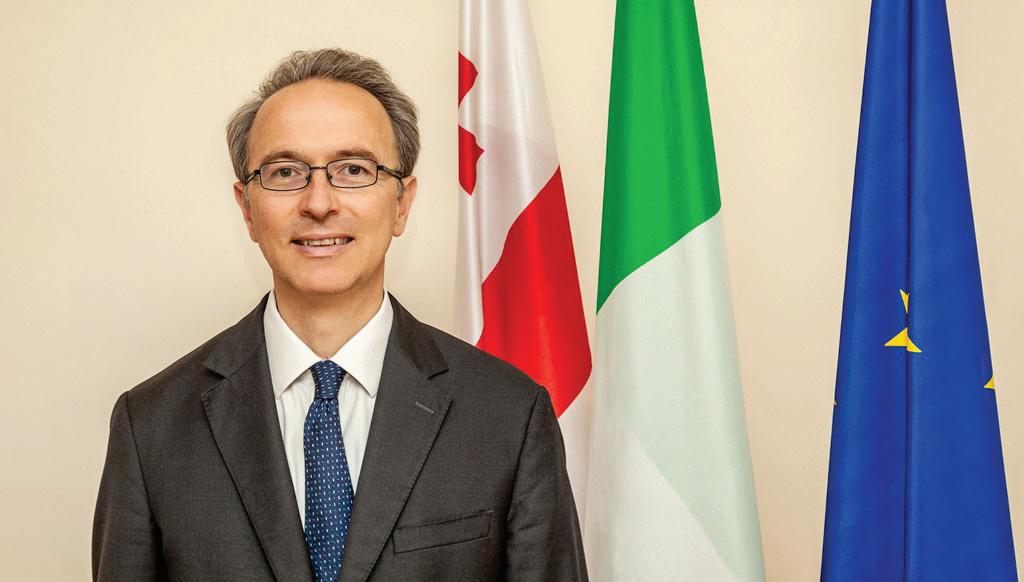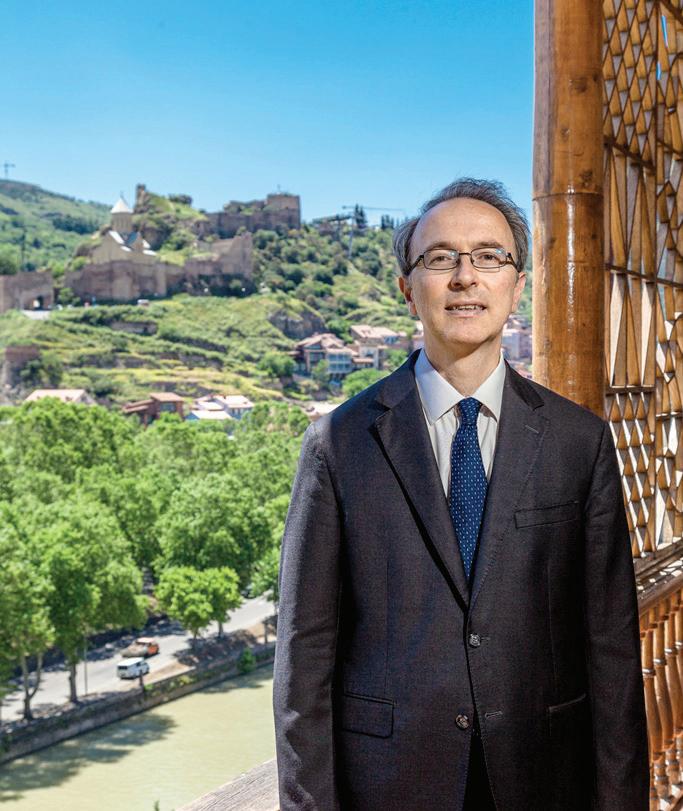
7 minute read
Ambassador of Italy : We Are Re-Planning and Launching Our Initiatives in Georgia From September - Diplomat Magazine
The European nation of Italy suffered huge consequences as a result of the coronavirus pandemic. Diplomat spoke to H.E., Enrico Valvo, the Ambassador of Italy to Georgia about the toll of the pandemic on the people of Italy and how the situation affected their diplomatic programs. Valvo shared interesting optimism about the many programs lined up in Georgia. He confirms that they are working hard for the success of each activity starting from September of 2020.
Mr. Ambassador, how has your life changed since the COVID-19 outbreak and how is the situation in your home country now?
Advertisement
Of course COVID-19 has changed the lives of all of us and mine was not an exception. From a professional point of view, I had to adapt to new working methods: remote working as a general rule and meetings replaced by videoconferences. This brought me to develop some informatics skills I did not expect to possess, but definitely I was very happy when prudent return to normality allowed me to return to classic diplomacy with direct meetings with my interlocutors. From a more personal point of view, I think that the situation created by COVID-19 demonstrated powerfully how human beings - including me - tend to give for granted the benefits of normality until they disappear.
The situation in Italy has improved enormously in the last weeks. Most restrictions were gradually and cautiously removed in the second half of May and in June and the epidemiological situation is currently very much under control, allowing the normal development of social and economic activities. The Italian relevant authorities are continuously monitoring the situation to react swiftly and effectively to any possible new outbreak. The Italian Government is now devoting its efforts to relaunching the economy, both with national measures and with measures to be agreed within the framework of the European Union.
Diplomacy in times of lockdown - how was your embassy handling the situation and what are the main challenges that you faced/still remain?
We basically implemented a combination of the rules which were implemented by the Georgian public administration and the Italian public administration. This means that for some weeks smart-working was the rule for most of the staff, with limited exceptions to deal with specific emergencies or ensure continuity in daily partnership with the Georgian authorities. In a second phase, the Embassy staff worked in shifts to avoid overcrowding, adopting specific health measures (frequent sanitation of rooms, use of masks, thermal scanning of staff and visitors, etc.). Currently, the Embassy is fully operational, including the consular/visa section. Of course specific health measures continue to be implemented.
In the first phase the main challenge was related to the fact that not every function can be performed remotely. Currently, one of the challenges is that the necessary health measures (particularly for access to consular/visa section) have an impact on the timing of our services to the public.

What type of activities were you planning in 2020 before the virus crisis began and how have your plans been affected?
We were planning a series of activities in Georgia, in terms of cultural initiatives (including seminars with the participation of experts) and political visits (namely in the parliamentary sphere). Of course because of the global pandemic it was not possible to implement them. But we have started a prudent re-planning of initiatives in Georgia starting from September and we hope the situation will allow us to restart dynamically. We’ll also re-open shortly the desk in Tbilisi of the Italian Trade Agency, in order to further promote economic co-operation.
I wish to highlight one specific activity which we were able not to cancel, thanks to the excellent co-operation of the Georgian authorities, namely the Italian participation from 7th to 9th April of the Italian frigate “Fasan”, as a Flagship of the naval group, to the training activities of the ‘Standing NATO Maritime Countermeasures Group 2 in proximity of Poti to the benefit of the Georgian Border Police. It was a way to demonstrate the Italian commitment to the Georgia-NATO partnership despite problems related to the global pandemics.

Do you find it easy to actually get out of the embassy and see our country? What are your plans in this regard? Have you already found the attractions that you like most in Georgia?
From the moment Georgian regulations have allowed free movement in the Country, I have started to travel extensively over the weekends and during a short holiday to get a first-hand experience of Georgia’s rightly famous touristic attractions. I had the chance to enjoy the majestic views of Svaneti (especially Mount Ushba and the incredible village of Ushguli), the busy life of Batumi and the pleasant beach of Kvariati, the fascinating cave city of Vardzia and the wonderful vineyards of Kakheti. But what I liked most was Mount Kazbegi from the iconic Gergeti churches. In Georgia I can find the same perfect mixture of nature and culture which I can find in my homeland.
What was your first impression about the country? Did it meet your expectations?
Georgia enjoys an impressive reputation of hospitality, openness, flexibility and love for freedom. My first months in Georgia have confirmed that this reputation is definitely well grounded. And they have led me to discover the many similarities between Italians and Georgians, including a positive attitude to life and all what it can offer.
COVID-19 pandemic is a challenge for the tourism industry, what would be your advice to the Georgian people and government on how to transform this challenge into an opportunity?
It is not up to me to provide advice on how to address the issues of tourism during the global pandemics. All related decisions require a very careful balance between economic and health considerations. What I can do is to share the Italian experience which might be of interest because the percentage of tourism on our GDP is similar to the one of Georgia. In Italy one of the main concerns was to re-energize the tourism sector after the problems we had from March to May. A lot was achieved by restoring normal functioning of the Schengen space. In parallel, specific health protocols were developed for each touristic activity and the relevant information was widely disseminated to our main traditional tourism partners. Results are encouraging, although the situation this summer will not be so good as in the past, because of the level of the pandemics in some of our important target markets.

The situation with coronavirus will affect the trade of Georgia and Italy. What measures are being taken in connection with this?
The situation with Coronavirus is affecting trade on a global scale, not only between Georgia and Italy. Regulations which have been adopted on both sides guarantee the safe and smooth transit of goods, but I am afraid that consumption patterns in both Countries have already been negatively influenced by the effects of the global pandemics. We are determined to promote a return to growth in trade and the next re-opening of a desk of the Italian Trade Agency in Tbilisi, which I mentioned, is part of this strategy.
You have been working in the Embassy of Italy in Russia between 2008-2012, these are the years when the conflict between Georgia and Russia occurred, as a result Russian troops remain on the territory of Georgia continuing borderization and kidnapping Georgian citizens, what are your thoughts on that, how do you think this conflict could be solved?
Yes, you are right. I arrived in Moscow in August 2008 when the conflict had just started and I saw the beginning of many negative developments which are unfortunately still unfolding today. Also for these reasons I do not miss any opportunity to stress that Italy strongly supports the territorial integrity and sovereignty of Georgia within its internationally recognized borders. As for the search for a solution to the conflict, I think that the policy followed up to now is rational: no-recognition combined with the promotion of grass root contacts of population on both sides of the ABLs and active participation in the Geneva International Discussions. Let me also stress the importance of the EUMM and of its role as an impartial and objective monitor.
How do you assess democratic developments in Georgia and what are your recommendations for the coming parliamentary elections this autumn?
In my view, Georgia is clearly progressing in its path towards European and western institutions. This regards several aspects of socio-economic as well as political life. I welcome recent constitutional amendments on the electoral system as a step towards rules of the game which respond to a widespread aspiration in the Georgian society and thus represent an advancement in terms of democracy. As for the next parliamentary elections, I wish to stress that the expectation of all partners and friends of Georgia is for them to take place according to the highest standards and in a less polarized environment.










